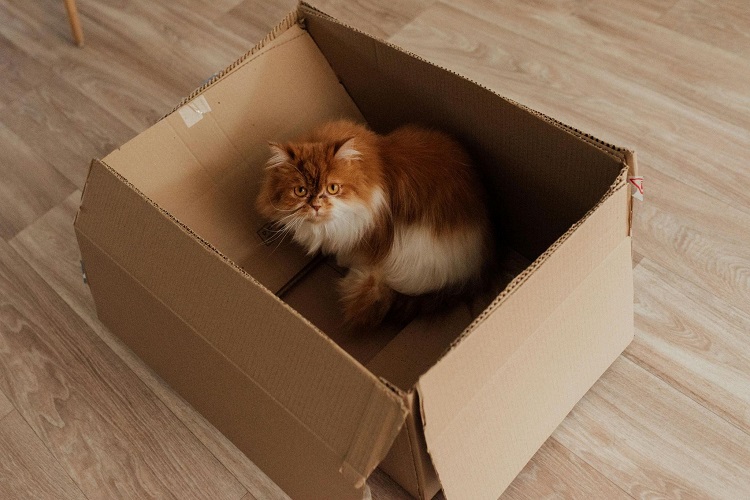Ah, the enigmatic allure of the cardboard box, a seemingly mundane object that transforms into a feline’s fortress of solitude, a hidden lair of leisure, a bastion of bliss. There’s no shortage of anecdotal evidence showcasing cats’ love for boxes.
Go on almost any social media platform and you’ll see videos of Siamese, Persian cats, and all sorts of cats squeezing into improbably small boxes, choosing a simple cardboard box over an expensive cat bed, or playing for hours with a box-turned-toy.
In the world of a cat, the box is more than just a simple container. It’s a place of safety, a playground of possibilities, a shield against the chaos of the outside world. This fascination, often amusing and confusing to us humans, is deeply rooted in the cat’s psyche and evolutionary past.
Table of Contents
Why Do Cats Love Boxes?
To truly understand why cats are drawn to boxes, one must first appreciate the essence of feline behavior. Cats, by nature, are creatures of comfort and control. They seek environments where they feel secure, where threats are minimized, and where they can observe without being observed.
The box offers a unique combination of these elements. Its enclosed space provides a sense of security, a snug fit that offers warmth and comfort. The walls of a box deliver a physical barrier, creating a sense of control and boundary that is deeply ingrained in the feline mind.
Scientific Explanation
Psychological Comfort of Confined Spaces
Cats, like their larger feline counterparts, are both predators and prey. This dual aspect of their nature profoundly influences their behavior. The small, enclosed space of a box provides an ideal vantage point for observing the world while remaining unseen—a perfect strategy for a creature that must always be aware of potential threats and opportunities.
This preference for enclosed spaces is known as ‘thigmotaxis,’ a behavior exhibited by many animals, including humans, in stressful situations.
In the controlled environment of a home, a box still fulfills this deep-seated need for a secure hideout. Behavioral studies suggest that the confinement of a box may trigger endorphin release, reducing stress and inducing a state of calm and relaxation. This is particularly evident in shelter cats, who often face high-stress environments.
Research has shown that cats with access to hiding boxes experience lower stress levels, faster acclimatization to new environments, and better overall health.
Echoes of Ancestors
To fully grasp why boxes are so appealing to domestic cats, we must venture back to their wild ancestors. In the untamed landscapes where these ancestors roamed, survival hinged on stealth and secrecy. Small, enclosed spaces like burrows, hollows, and thickets offered the perfect refuge from predators and a concealed spot for ambushing prey.
This ancestral behavior is vividly alive in our domestic cats. When they leap into a box, they are echoing the actions of their wild forebears, seeking a secure spot that offers both protection and a strategic advantage. The box is their modern-day thicket, their urban burrow, providing an instinctual comfort that has been passed down through generations.
Temperature Regulation
Another fascinating aspect of a cat’s love for boxes is their quest for thermal comfort. Cats are more sensitive to temperature changes than humans and prefer a slightly warmer environment. The insulating properties of cardboard make boxes an ideal spot for maintaining body heat.
Scientific studies have delved into this aspect of feline behavior, demonstrating that cats often seek out warm spots to conserve energy. This behavior is not just a preference but a physiological necessity. By curling up in a box, a cat can maintain its body temperature more efficiently, conserving energy for other vital functions.
Myth-Busting
There are many myths and misconceptions about cats and their boxy obsessions. One common belief is that cats only seek boxes when they are sick or stressed. While boxes do provide a safe haven in times of stress, their allure is not limited to these situations. Healthy, happy cats are just as likely to seek out the comforting confines of a box.
Another myth is that all cats love boxes. While many do, each cat is an individual with its own preferences and personality. Some may prefer open spaces or other types of hiding spots.
Conclusion
A cat’s love for boxes is rooted in their psychology and evolutionary history. Cats, often unlike humans, are capable of finding joy and security in the simplest of things. So if your cat chooses their box over their fancy new cat tower, don’t get mad – they appreciate your effort anyway.







